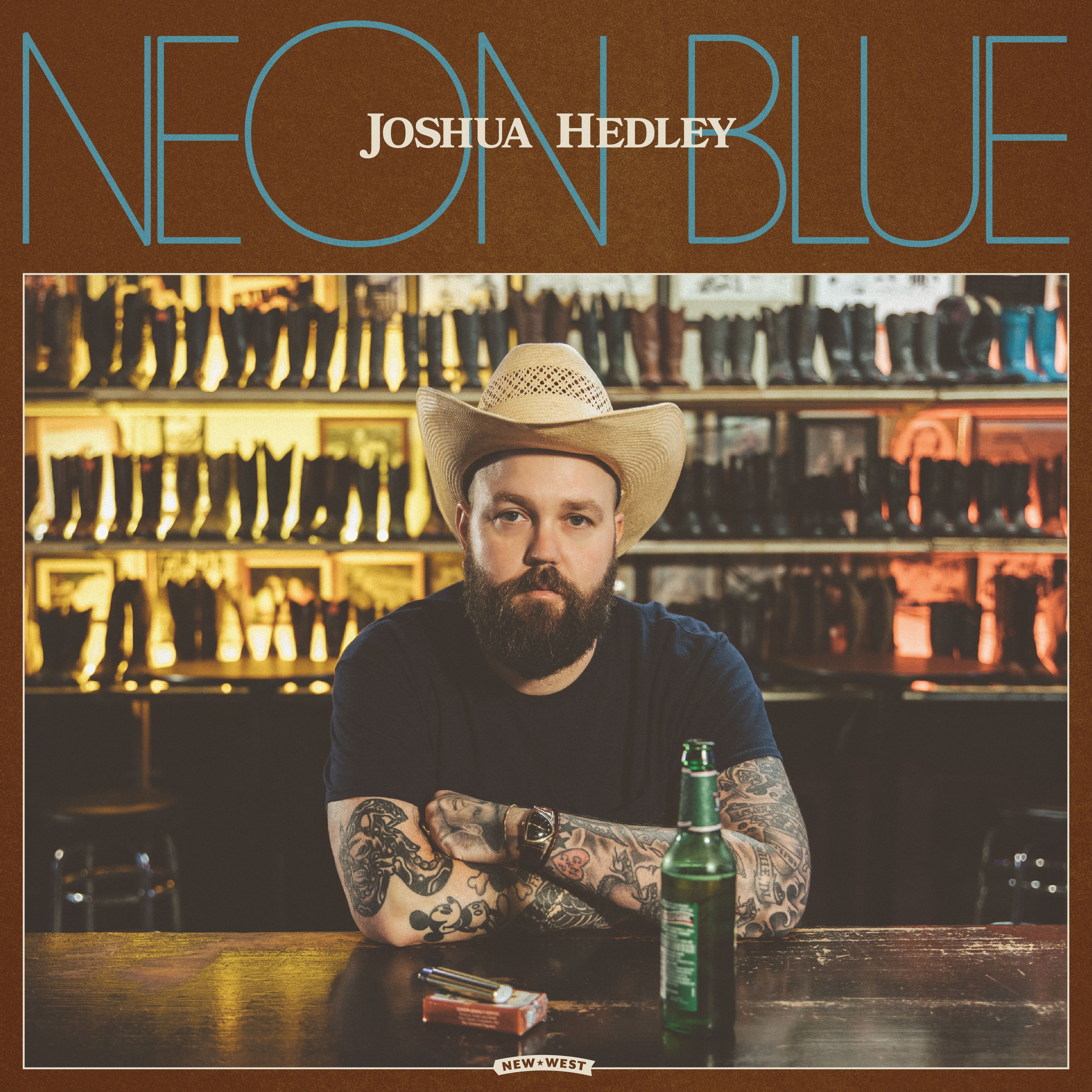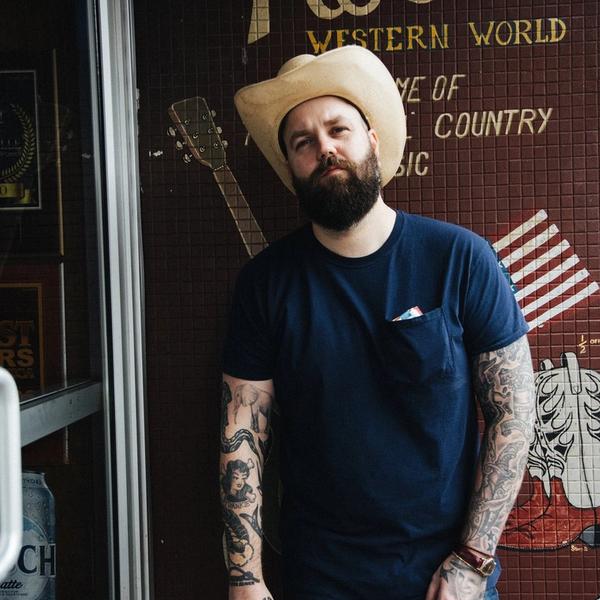
New West | 2022





Link copied

Joshua Hedley is sitting in his bedroom in Nashville, his 58 Gibson LG1 guitar and a couple of hats hanging on the wall behind him. It’s the creative hub where he writes his songs and does his thinking – and he’s got a lot to say about his new, sophomore album Neon Blue, and country music in general.
Heads turned when Joshua Hedley (aka ‘Hed’) put out his 2018 debut album, Mr Jukebox, influenced by listening to early countrypolitan records from producers like Owen Bradley and Chet Atkins. But this time round, for Neon Blue, he’s gone down a completely different sonic wormhole of 90s music.
“I’m so influenced by the past, I think whatever I’m listening to is what’s going to happen on the record.” His tastes may keep changing, he says, but “the one constant is that, whatever I do, it’s going to be country music – and the definition of that is a pretty broad stroke. You can look back at the Carter family, then at Ronnie Milsap, and both sound completely different, but they were both country music.”
The message from Hed is to expect the unexpected, as he guarantees his next record won’t sound like his first two. “Everything I do is something that I hold in high esteem. You could say it’s almost a tribute.”
He won’t be categorised as Americana, though. “I tend to shy away from that word; I consider myself a country singer. I feel Americana is sort of catch-all term to encompass genres that are no longer mainstream. When you take the identity away from country, from folk and from blues, it waters everything down. It seems there is a lack of reverence for the history within that term.”
“I do understand it’s to do with wanting to make sure that this particular style is completely removed from the modern sound of country music. My own music is completely removed from the modern sound of country music, but that doesn’t make it any less country than Luke Bryan. We’re doing different things but both fall under the heading of country music to me.”
Hed warms to his theme when talking of his vocal influences, including the great Merle Haggard. “I was drawn to something about his voice, the sound and the timbre. Not only were guys like him and George Jones and Johnny Paycheck great singers, but they also had distinctive qualities to their voices, which is something you don’t hear too much of any more, especially in the mainstream world where everything is sort of cookie cutter and everybody sounds the same. But if you turn on the radio and there’s a George Jones song, it takes you a nanosecond to recognise that it’s him.”
According to Hedley, the notable exceptions are women in country music, who have to work twice as hard as the men to get half the recognition, and have each developed their own style. “If we’re talking mainstream country,” he says, “Miranda Lambert is doing 100 times more interesting things than Jason Aldean, whose music couldn’t be more bland and boring.”
Hed sees artistry in country women’s output where it’s lacking in the male spectrum of country, because the radio will still play them, based on their name rather than their music.
“Morgan Wallen can shit out a song and it’s going to get radio play just because it’s Morgan Wallen, and he’s built up this massive following and he’s got a funny haircut. He’s going to get lots of airplay just based on that – but the women have to actually fight for airplay on country radio. So there’s an intensive labour into what goes into their style, and it’s thought-out, it’s real.”
Hed’s own artistry started to find its focus for Neon Blue when Joe Diffie died, in March 2020. He immediately immersed himself in Diffie’s catalogue, spreading out into that whole era of music, which was on the radio when Hedley was young.
“It helped me through a lot, those good feelings of nostalgia tied to that sound. It took me back to time in my life when I was less concerned with what was going on. I didn’t know about bills and stress; I needed that escape and it made me feel a certain way.”
So when his label, New West Records, hit him up about an album he twigged that everybody might like to feel that way. He knew this record was going to be heavily influenced by the 90s, but still wanted it to feel fresh. So whereas Mr Jukebox had been like a study, “to see if I could make a countrypolitan record that sounded like the records of the 60s” he took more influences for Neon Blue. “I didn’t want to be so rigidly attached to perfecting the genre. The sound is undeniably 90s, but it still feels new to me.”
Listening to Neon Blue, you can hear echoes of everyone from Randy Travis, George Strait and Lyle Lovett to Nanci Griffith, Reba McEntire and Garth Brooks. From the production standpoint Hedley wanted to try making it the “straight-up Nashville way”, so he used the cream of the session musicians.
“It was a clinic in song-making, from the writing process all the way to recording it with those guys, it’s just a science they have down. I don’t think it took longer than 30 minutes to write any of the songs on that record.”
Typically thoughtful, Joshua Hedley has spent much time mulling over the songs that left a mark on him and did honestly change his life – and these are the six he can’t get out of his head.
I started playing fiddle when I was eight, starting with classical lessons. My teacher knew I wanted to play the fiddle, so she would teach herself these fiddle tunes and then teach them to me. That’s how I got into country and bluegrass and fiddle, through learning these little tunes.
I discovered Bob Wills when I was about 10-years-old, and the first song that I ever heard of his – which is probably his biggest song – was ‘New San Antonio Rose’. That was the first time I had heard fiddle presented outside of fiddle tunes and bluegrass; it was almost jazz. I’d never heard anything like it.
This song’s got a special place in my heart and was my intro to Merle Haggard. I have Bob Wills tattooed on my left hand and my right hand is reserved for Merle, because those are the two guys that made me want to do this. I found them at roughly the same age, when I was young.
Something about his voice drew me to it and I actually have the intro, the chord changes in the Nashville number system – 11 44 15 11 – I have them tattooed on my knuckles. It was my first love in country music and also my dad’s favourite song that he liked me to sing when he was alive.
When I was nine, I entered myself into a 4H talent show that was happening in the cafeteria at my school, and I decided I was going to sing ‘Gone Country’ by Alan Jackson. It was the first time that I performed in front of an audience larger than eight or 10 people. It was going to be the first time that I ever sang in front of people and my mom remembers it better than me.
She told me to bring my fiddle just in case, and sure enough right before we went on I decided that I couldn’t sing it; I couldn’t sing in front of people. So I went out there with my fiddle and just played the melody to ‘Gone Country’ on top of the CD, and that was the first time I performed in front of people.
It’s a Roger Miller song, but I’d specifically choose the Randy Travis version of ‘King of the Road’. It was the first time I ever heard Roger Miller. I didn’t know who he was; I just knew I liked that song. That got me into not only Roger Miller specifically, but also thinking about songwriting and lyrics and it was also the first song I ever sang in front of people, aged 14 or 15.
That was the first time I ever had the nerve to get up in front of people and sing a song. I’d been singing my whole life, but in the car, on the way to school and at my house, singing along to Bob Wills and Merle Haggard records.
I was a fiddle player by trade up to that point and already doing it on a professional level – playing fiddle in bands. I don’t know what it was that clicked in me, but I decided I could sing in front of people, and that was the song I sang, because I heard Randy Travis’ version on the radio.
This is the song that influenced ‘Mr Jukebox’, and it was a song I dreamed. I always thought it was bullshit when songwriters said they dreamed a song; I always thought “yeah right, that’s a good story”. But then I did it. I dreamed the song ‘Mr Jukebox’ with all the chord changes and lyrics, and I woke up and wrote it down.
When we got into the studio I had this work tape of me and a guitar playing this song, and a rough idea of what I wanted from a production standpoint. I’d been listening to a lot of early Johnny Paycheck at the time, and the song ‘Help me Hank, I’m Falling’ is his lament to Hank Cochran to write him another hit song. It’s got all these stops in it and that’s where I got the idea for that in ‘Mr Jukebox’, to throw back to that Little Darlin Records era.
The inspiration, the thing that started the journey that became Neon Blue, is a Joe Diffie song called ‘Is It Cold in Here?’ It’s a wonderful country ballad, stone-cold country. When you hear Joe Diffie, you think of stuff like ‘John Deere Green’ or ‘Third Rock from the Sun’, these sort of silly songs.
But he also hit on these deep-cut country songs that are just country to the bone, and I’ve always loved that song. That was the first song I listen to after he passed away, and it started my deep dive into 90s country that influenced the songs that would become Neon Blue.
---
Joshua Hedley's new record, Neon Blue, is released on Friday April 22nd via New West Records. Read our full review here, and purchase the record from our selected partners below:

New West | 2022
Items featured on Holler are first selected by our editorial team and then made available to buy. When you buy something through our retail links, we may earn an affiliate commission.,
